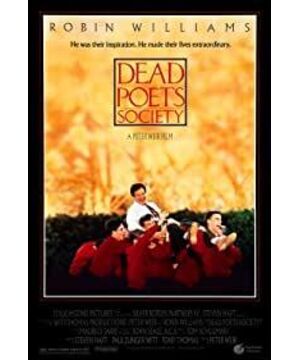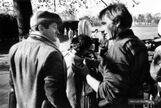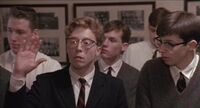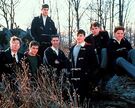O Captain, My Captain!
When the writing was marked by the words "transmitting positive energy" in red, we knew that this was not an accidental personal tragedy, but a structural tragedy that pierced the ice tip of the sea.
We care about Miao Kexin because we care about all Miao Kexin. Some of them have reached this point in misfortune, while others are still suffering and struggling.
We should continue to pay attention to the case dynamics, and we should also ask ourselves: What kind of education is what we need and pursue?
The film "Death Poetry Society" suddenly appeared in my mind. From the classroom in high school to the dormitory in college, I watched it two or three times, but frankly speaking, it has not become indelible in my heart. Part of the memory, because I did not fully appreciate its weight.
Things change and the stars are moving, the years are increasing, but the mood is not what it used to be, and it is worth the grief brought by this tragic event. This viewing experience is undoubtedly special.
It now appears that the whole movie is actually just a few lessons of Keating. In Keating's short teaching career, among his few disciples, he hastily, but Shu Ji fulfilled his own vision of education.
First class: Time to have fun
Keating appeared on the stage with a whistle and walking in the courtyard. After sweeping away the rigid and boring images of other teachers, the students were shocked and even felt absurd and funny.
Like a poet walking through flower dew, like a spring breeze blowing in a deep pool, Keating's maverick demeanor has been revealed in the first second.
This seemingly casual literature teacher was actually very attentive to the first class. At the opening ceremony, the school used extravagant and austere ostentation and ceremonies, and the principal personally instructed the four major school mottos of this century-old school:
Tradition! honor! discipline! excellence!
Keating’s first class is actually a re-organization of the opening ceremony for the students in his class. However, there is no authoritative oppression in this ceremony, the atmosphere is relaxed, and the words are simple.
Keating took the students to a place similar to the school history honors showroom and asked the students to look at the senior alumni in the old photos. Usually at this time, as a teacher, you have to start giving an inspirational speech, but Keating is not like that.
Keating said that the children you see have now been turned into fertilizer for daffodils. As Cao Cao said in "Turtle Shoushou": "Snake soars in the fog, and it will eventually become dust."
Keating deliberately used lame hypnotism to get students close to the wall of pictures and listened. He disguised himself as the soul of an alumnus on the wall, with a funny posture, but issued a kind exhortation: "Grasp... grasp... grasp the present."
This is a very vernacular truth. Time is like an arrow, and fame is like dust. It is better to cherish the moment and be timely-enjoy it!
But this is a very vernacular truth, in a highly militarized and politicized college system, no teacher will tell you.
They all say: tradition, honor, discipline, excellence.
They will all say: college entrance examination, advancement, scores, do questions.
They will not say: life, youth, health, happiness.
So Mr. Keating’s first class was aimed at the principal’s publicity ceremony at the school opening ceremony that was useless for students except for demonstrating power. It's just that, compared to the principal's so serious, he easily subverted this set of bluffing things.
Second class: Letting go of bad authority
In the second class, enter the main topic of text teaching. Keating teaches English poetry. As usual, the unwinding is a guide. Keating asked a student to read aloud the opinions of this academic guide, and then looked down at the stage politely, with a smile on his face and a fragrant mouth: "Dung."
He opposes this poetic theory that emphasizes metric, rhyme, rhetoric, and thematic meaning from the very beginning. The reason is also very simple, because for poetry, the most important thing is poetry. Poetry is not a melody as a method of creation, and it is not the main idea given by textbooks. So what is poetry?
Poetry is language, it is words. Poetry is the way of thinking and behavior of human beings. Poetry, like engineering, business, and science, is necessary for human survival and development, because poetry pursues beauty, romance, love, and freedom. Reading poems and writing poems are one of the manifestations of the value of human existence.
But the stale authority has abandoned the subject and value of poetry, and instilled things that are contrary to the way of poetry. That's not poetry, that's not what poetry gives us, it's just something they want to instill in us. Their ideas, their fascination. Rape of will, deprivation of freedom.
So we turned around and shred their manifesto. Take back our language and writing, take back our poetry, take back our own voice.
Just as Keating asked: If life were a poem, what kind of poem would you offer?
The third class: Look at the world from another angle
In the first half of the third class, Keating used a wealth of body movements and language skills to teach the students Shakespeare’s poems that the students thought were boring. Chinese language teachers should really learn and strengthen their own skills. Solving Lu Xun’s essays has always become a teaching task. Old and difficult question.
The sad part of this passage is that it buried a tragedy. The protagonist Neil, who was suppressed by his father for a long time, was deeply infected by Keating and fell in love with the theater and performing arts.
In the second half of this class, Keating leads the students to stand on the stage and see the world with different eyes when learning. What is the use of different perspectives? For example, when you stand on the podium, you will suddenly find that you are level with the famous philosophers and sages hanging on the wall. You wait and see them instead of looking up as usual. This allows you to learn to look at authority head-up, to examine authority, and to value your own perspective and vision. You are no longer just passively accepting indoctrination.
The fourth class: Let the flying nature and intuition
In the fourth class, the weight was added again. Keating asked each student to create a poem and read it out in public.
This topic is very difficult for every student, but there is only one person who is completely embarrassed, and that is Todd, one of the protagonists played by the young Ethan Hawke.
What Tao De lacks is not talent, but self-confidence and courage. He wanted to break through his own shortcomings. After the first class, he wrote "Grasp the present" in his notebook, but he didn't know where to start, so he had to tear it up. Coincidentally, after thinking and writing for a long time, he still tore off the verses he had forced out.
Keating had long known the problem of Todd's inferiority and cowardice, and frequently hit him on the side, but it was just enough to stop. But this time, Keating found the right time and decided to stimulate him.
Keating used a very primitive method to first awaken Todd's physical wildness. Immediately afterwards, there was no room for breath, forcing him to use the adrenaline in this cavity to improvise poems orally on the spot. As a result, Todd vented his usual accumulation of moments, and completed a high-level initial cry in the high-speed collision of the senses.
I close my eyes
This portrait is floating beside me
A lunatic with sweaty teeth
His gaze bombarded my brain
Reach out his hand to strangle my throat
He mumbled to himself from beginning to end
Mumbling to the truth
Like a blanket that can never warm your feet
Let you cover it up and cover it up
It was too short
From when we fell to the ground until we passed away forever
Cover your cheeks only when you wailing and crying
If a person only knows the accumulation, and there is no stage of thin hair and re-creation, then knowledge is useless, and a person is just a dictionary full of broken messages and textbooks in the original format. The next step in bravely seeking knowledge is to express bravely. Who can say that one's heart is worthless? Who would think that his heart is worthless?
Class 5: Choose your own life path
Teacher Keating is undoubtedly an educational artist, he can allegory abstract truths into concrete plots. The content of this class still seems casual and simple: walking.
He randomly picked three students to stand and walk together. We found that at first the three people's gait was different. Some are rigorous, some are hesitant. But as they walked, the three people gradually walked out of a line from the scattered state, lowering their heads to align their steps in order to be consistent with others. In the end it almost became a step in the army. The students onlookers clapped rhythmically for some reason, and the applause echoed with the rhythm of the pace.
Keating's topic through this small incident is the blind obedience of human beings in the collective. Of course, human beings need to express their common will through some consistent ritual actions, and be closely connected with each other, such as people's common silence after a catastrophe. It is not this part that Keating wants to criticize. He hopes to trigger a habit of reflection, so that when every student makes any consistent behavior in the future, he must think about why he did it and whether he did it out of his own will. He also hopes that every student can realize that we are born different, just like when the walking game begins, everyone walks differently.
The collective unconscious is an extremely easy vortex to fall into, and it is extremely easy to make a choice under the authority of authority. However, it is far from easy to stick to one's own beliefs and firmly believe in the values of one's niche.
But the feet are under the legs, the road is under the feet, life is one's own life, how can others try to define it for you? Just as Keating quoted Frost's famous line: "There are two roads in a forest, and I chose the one that is inaccessible." To walk my own way requires the courage to walk alone.
The last lesson: Victory never ends
The last lesson is actually absent. Keating was fired as a scapegoat for Neal's death at the time. He was charged with setting up a death poetry club and inciting students to indulge. The members of the Death Poetry Club, his disciples, under the threat of the school's authority, signed and gave in and became accomplices. This is the greatest tragedy. Keating's education is exactly anti-authoritative education, but in the end his disciples were either crushed to pieces by authority or still stubborn. The most distressing thing is that his favorite disciples also succumbed to the slaughter.
Keating is smiling and tolerant, but undoubtedly lonely. But at the end, he responded to his loneliness in the most powerful way, telling Keating that his education has never failed.
What I'm talking about is not the classic picture of students stepping on the desk. I'm talking about Todd. The weakest character at the beginning of the film, but at the end he was the first student to stand up. It was he who walked onto the desk first and called out the phrase "O Captain, My Captain." Without his bravery, there would be no classic group portrait that would be eternally fixed afterwards.
In that classic picture, Todd stands at the back, a thin, small one, but he is the character in the middle of the picture.
Please note that in the end Keating said before leaving: "Thank you, boys." At this moment, he turned his head slightly and added: "Thank you." Then the picture was cut to Todd's face. The last "thank you" he said to Todd.
It was Todd who allowed Keating to leave comfortably.
So what is the content of the last lesson? It is farewell and failure, the price of choice, the struggle to continue, the resistance will never end, and the victory will never end. Companions, you may have seen the flow of blood, the halberd of the weak, but as long as mankind survives, history is endless, and the frustration of moments and events is by no means an excuse for us to give up.
Attached
In fact, the words have been said, but sometimes it is necessary to make a targeted analysis of specific situations.
Some commentators believed that Keating "teaching became an idealistic poet, but did not teach them the cruelty of reality." This reminds me that after the misfortune of Miao Kexin, some self-media articles began to emphasize the importance of "frustration education". In my opinion, the mainstream of things is not whether or not "frustration education" should be implemented, but how to destroy this infinite "education setback".
My friends, Keating is not the wagon wheel that crushes the jagged bodies of the teenagers, those talents are. Keating is the cornerstone of education to repair and mend the broken bodies of children.
Students, don't turn your back on Keating, and don't forget Miao Kexin.
(The articles are all first published on the personal public account "Duan Xuesheng", welcome to subscribe)
View more about Dead Poets Society reviews






